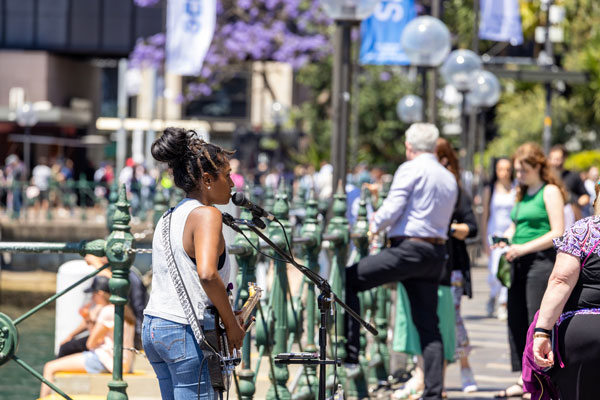They are the lifeblood of our vibrant streets, charming passersby with everything from soulful musical covers to mesmerising performance art. Yet behind the performances lies a reality – busking can be a precarious gig. Unclear regulations, competition for prime spots, and even harassment can dampen the joy of performing in public.
Last month, two buskers clashed over a coveted performance spot at Pitt Street mall. Widya Tjong, a singer, was about to perform her next song when another busker Vasiliy Shapkin, a violinist, interrupted her and demanded she pack up and leave.
The altercation was captured during Tjong’s livestream on TikTok, which has garnered over 2 million views.
“I think you should start packing up, I’m starting at 2pm” Shapkin says in the video.
Tjong had been performing for 20 minutes before the confrontation and said that there was no one there when she started.
Shapkin claimed to have “reserved” the spot for 2pm before Tjong had arrived by leaving his equipment close by but not in the busking pitch because of the sun.
“Why didn’t you tell me before I start setting up?” Tjong asks.
“At the time when you came, I wasn’t there because I left briefly and then I came back,” Shapkin retorts.
The nearly 10-minute video shows Shapkin continually cite unwritten rules, aggressively talking over Tjong, before she becomes emotional and eventually concedes the space.
Bystanders intervened, accusing Shapkin of bullying. Netizens followed suit, with viewers expressing solidarity with Tjong and condemning Shapkin’s behavior.
In the wake of the online backlash, Shapkin has since deleted his social media accounts and could not be contacted for comment. Tjong, overwhelmed by the outpouring of support, expressed her gratitude to her fans in a follow up post the next day.
“I just want to thank each and every one of you for sending out love, kindness and support,” she wrote. “I’m not giving up on my dream.”
While the specifics of claiming a space remain unclear, many commentators condemned Shapkin’s aggressive approach.
But it is not the first incident involving Shapkin. A YouTube video from 2019 shows him setting up and playing over another performer’s set at the same location.
“I thought I would put the video up though because the whole thing was pretty ridiculous. I hope it never happens again though.” The performer known as Gordo writes in his video description.
There isn’t an official booking system or reserved time slots for buskers. City of Sydney allows for “low impact” performances in designated areas of the mall for a maximum of two hours daily, between 11am and 7pm as outlined in their guide The Sydney Busking Code. However, these incidents have reignited discussions online about unwritten rules and etiquette among buskers, particularly regarding coveted performance spots.

What are the rules?
Defined busking laws establish designated performance zones, noise limits, and permit requirements. This reduces conflict with businesses and ensures a fair playing field for all buskers. But different council areas have their own rules and regulations.
In Sydney’s CBD, buskers are required to have a permit, issued by the City of Sydney council. However, this does not cover The Rocks or Circular Quay, which require a separate permit.
The Sydney Busking Code groups busking acts in three categories; Low Impact, Extended Duration, and High Impact.
Low Impact acts are those which take up less than two square meters of space and use naturally loud instruments such as drums, bagpipes or brass instruments. Most solo or duo musical acts will fall into this category and are allowed to perform up to two hours a day.
Extended Duration acts are quiet, non-amplified and non-musical where an artist creates a work of art continuously over a long period of time such as paintings and pavement art. Providing these acts do not restrict people from moving about, they can be performed for up to 8 hours a day.
High Impact acts are those that require a large amount of space, feature more than five performers, or involve higher risk materials such as sharp objects. These acts are limited to one hour and need to be assessed by the City of Sydney to receive a permit.
While it is not hard to obtain a permit, the requirement of liability insurance in some council areas can be expensive and presents another challenge for buskers.
Buskers also need to be mindful of their performance content to avoid breaking public decency laws. In New South Wales, the Court of Appeal defines “offensive” as anything that could displease, annoy, or insult a reasonable person [R vs Smith, 1974]. This means avoiding language or actions that might cause hurt, anger, disgust, or outrage.
In 2013, two street performers with permission from Manly Council were stopped by police due to public complaints about their “nude” costumes with fake genitals. This highlights the potential conflict between artistic expression and public sensibilities.
Should there be a booking system?
Currently, Sydney does not have a booking system in place. Instead, the process is self-managed by the busking community. However, this system presents issues for the busking community, as Filipino singer-songwriter Kaydin Umali tells LSJ.
“It is a bit hard to find a busking pitch in Sydney as some councils are not very clear with the pitches where buskers can setup,” Umali says.
“It is also a first come, first serve basis for buskers to get a busking pitch. I don’t think any busking pitch is managed or checked.”
She describes an experience where another busker set up and performed right next to her, overpowering her performance. It is a scenario similar to the one Gordo experienced and highlights the problem of a “self-managed” system.
“I just started busking and another busker just pitched next to me, three meters away where I can hear his loud sounds overpowering mine. I had to transfer to another pitch. It was a bit rude and a hassle for me,” Umali says.

An online booking system for public performance spaces would allow buskers to reserve prime spots in advance which possibly eliminate the stress of “claiming” territory and potential confrontation.
Countries like the Philippines and Singapore have successfully implemented online booking systems for buskers.
Umali says in Manila, the country’s capital, where she used to perform, there are busking slots and pitches for artists to choose from online as a first come first serve basis.
“Once reserved, those pitches are now scheduled for each busker. It was easier to have a scheduled and reserved busking pitch,” Umali says.
In Singapore, the country’s National Arts Council (NAC) introduced an online booking system in March 2022 that gives each busker access to 80 locations across the island and to book up to six one-hour slots per day, ensuring a mix of different acts at each location.
While an online booking system has the potential to improve organisation and visibility, it would need careful design and implementation by local councils to protect and support performers but at the same time avoid stifling the creative spirit of busking.
This spirit invigorates our city. It is a vibrant exchange where performers transform footpaths into open-air stages and captivate audiences with their talent and passion. A raw and intimate experience, fuelled by the energy of the crowd. It is more than just a performance, it is a conversation between artist and audience, and one that we need to ensure continues.




